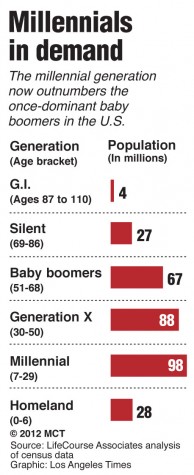Millennials redefine modern political engagement
January 22, 2015
 Courtesy of MCT campus
Courtesy of MCT campus
As most of us may have noticed, the congressional elections this past November resulted in a historically low voter turnout — just 36.4 percent of eligible voters participated, the lowest since WWII. However, this is still 15 percent higher than eligible millennial voters, whose turn out came in at 21.3 percent, according to Pew Polling. Younger voters instead took to the Internet and its various social networking sites to outline salient political issues and their favored positions in lieu of showing up to the polls.
Within days of the election, President Obama announced his plan to expand his Deferred Action for Childhood Arrivals program to include parents of young immigrant “dreamers” and allow them to avoid deportation by gaining a pathway to legal status via executive action — a policy position that 55 percent of millennials reportedly supported. This followed a summer flooded with “#dreamer” Internet testimonials in the aftermath of over 100,000 unaccompanied minors fleeing violence in Central America, particularly from Honduras.
On Nov. 10, the president publically advised the Federal Communications Commission to adopt stricter guidelines for Internet Service Providers that would treat the Internet like other public utilities, which is commonly referred to as, net neutrality. This development is considerable, because presidents almost never interfere with the FCC’s policy decision-making process since it operates independently and in a nonpartisan fashion. This announcement also came on the heels of Internet users disabling the FCC’s webpage with comments supporting net neutrality.
Just last week, President Obama unveiled a $60 billion plan to provide two years of free community college to anyone willing to work for it. The average student in America has $28,400 in student loan debt, and $23,854 in Louisiana, according to the Congressional Budget Office report this September. The weight of this burden affects college students who are privileged enough to attend college and acts as a disincentive for those who can’t. This problem is universal among young people.
It is undeniable that the president has been publically reaching out to young voters across the political spectrum and has been directly offering solutions to their problems. But why would the president consider the policy preferences of a group who stayed home four to one?
These are the political issues millennials are talking about while online with their peers. I see pro-amnesty stories and articles, explanations of net neutrality and its importance, and complaints about the cost of college every time I pull up a social network. Any politician who wants to appeal to young voters would naturally look to the Internet to identify and attempt to address these problems. The president seems to have recognized that a vital component of his coalition won’t tow the party line during election season, but nevertheless needs to be engaged with. Without engaging those in the 18-29 age bracket, the president and his party will continue to see voter drop off.
Young voters have gotten the president’s attention because there are many of us, we’re untapped and we’re actively redefining political discussions and what political participation looks like. Instead of punishing one party by voting for another, millennials are shunning the candidates completely and using Facebook, Twitter, Reddit and Tumblr to air their grievances until the parties consider issues that impact them.





